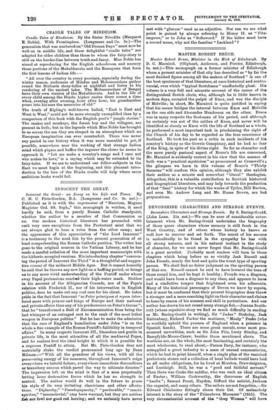INNOCENT THE GREAT.
Innocent the Great : an Essay on his Life and Times. By C. H. C. Pine-Gordon, B.A. (Longmans and Co. Os. net.)— Published as it is with the imprimatur of "Harriet's, Magnus Magister Ord. SS. Soph.," this monograph is written, it need hardly be said, from a purely Roman Catholic standpoint, whether the author be a member of that Communion or no. Our modern historical literature has proceeded with such very rare exceptions from the Protestant mint that we are always glad to hear a voice from the other camp; and the appearance of this appreciation of "the Lord Innocent" is a testimony to the need felt by the present generation of at least comprehending the Roman Catholic position. The writer has gone to the original sources in the Vatican Library, and he has made a careful collation of the more important manuscripts with the hitherto accepted versions. His introductory chapter "concern- ing the period of Innocent the Third" is a thoughtful and sugges- tive risumi of the midmost Middle Ages. But it cannot honestly be said that he throws any new light on a baffling period, or brings no to any more vivid understanding of the Pontiff under whose sway Papal pretensions reached their high-water mark. Neither in his account of the Albigensian Crusade, nor of the Pope's relation with Frederick II., nor of his intervention in English polities, does he make out any real case for his client. He takes pride in the fact that Innocent "as Pater principum et regum inter- fered more with princes and kings of Europe and their national and private affairs than any of his predecessors on Peter's throne"; that he "transformed a Bull of Excommunication from being the last whimper of an outraged sect to the rank of the most lethal weapon in European politics." But he has to make the admission that the case of England's humiliation under John "is on the whole a fine example of the Roman Pontiff's fallibility in temporal affairs." In many respects Innocent III., blameless and gentle in private life, is the most attractive of all the mediaeval Popes, and he realises best the ideal height to which it is possible for a supreme Pontiff to attain. But Mr. Pine-Gordon does not materially shake the verdict pronounced long ago by Dean Milman :—" With all the grandeur of his views, with all the persevering energy of his measures, throughout Innocent's reign everywhere we behold failure, everywhere immediate discomfiture or transitory success which paved the way to ultimate disaster." The impression left on the mind is that of a man perpetually letting loose destructive forces which he hat no strength to control. The author would do well in the future to prune his style of its very irritating classicisms and other affecta- tions. "Diplarchy," "Pseudopaparchy," "perdurable," " Banal- spiral's," "unconclavial," may have warrant, but they are neither ftsh nor fowl nor good red herring; and we certainly have never
met with "glucose" used as an adjective. Nor can we see what point is gained by always referring to Henry II. as "- Fitz- empress," or to John as " Softsword." If the latter must have a second name, why not the familiar " Lackland " ?




















































 Previous page
Previous page